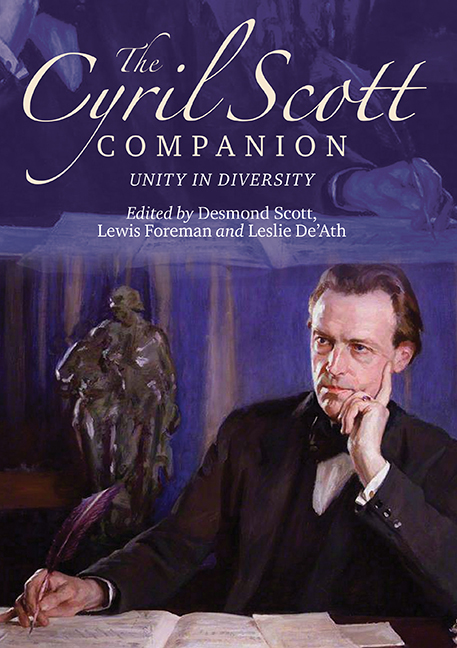Book contents
- Frontmatter
- Dedication
- Contents
- List of Illustrations
- List of Tables
- List of Contributors
- Foreword
- Preface
- Acknowledgements
- Editors' Note
- I SCOTT IN CONTEXT
- II THE MUSIC
- 8 Discovering, Editing and Recording Cyril Scott
- 9 ‘Years of Indiscretion’: The Early Piano Works, 1898–1909
- 10 ‘Like a Bird Sings’: The Piano Works from the Op. 66 Sonata to World War 1
- 11 The Later Piano Works
- 12 The Twenty-First-Century Orchestral Recordings: The Shock of the Unknown
- 13 The Chamber Music
- 14 Operas and Music for the Theatre
- 15 The Choral Works
- 16 The Songs
- III THE WRITINGS
- IV PERSONAL REMINISCENCES
- APPENDICES
- CATALOGUES, DISCOGRAPHY AND BIBLIOGRAPHY
- Index of Works
- General Index
14 - Operas and Music for the Theatre
from II - THE MUSIC
Published online by Cambridge University Press: 14 September 2019
- Frontmatter
- Dedication
- Contents
- List of Illustrations
- List of Tables
- List of Contributors
- Foreword
- Preface
- Acknowledgements
- Editors' Note
- I SCOTT IN CONTEXT
- II THE MUSIC
- 8 Discovering, Editing and Recording Cyril Scott
- 9 ‘Years of Indiscretion’: The Early Piano Works, 1898–1909
- 10 ‘Like a Bird Sings’: The Piano Works from the Op. 66 Sonata to World War 1
- 11 The Later Piano Works
- 12 The Twenty-First-Century Orchestral Recordings: The Shock of the Unknown
- 13 The Chamber Music
- 14 Operas and Music for the Theatre
- 15 The Choral Works
- 16 The Songs
- III THE WRITINGS
- IV PERSONAL REMINISCENCES
- APPENDICES
- CATALOGUES, DISCOGRAPHY AND BIBLIOGRAPHY
- Index of Works
- General Index
Summary
CYRIL Scott was a polymath. Nowhere is this more evident than in his considerable body of works for the theatre, including plays, musical plays, operas, operetta and incidental music. These, more than any single book, poem, painting or piece of music, embody a synthesis of Scott the musician, poet, author, artist, mystic, theosophist, occultist and man. The lure of the theatre or opera house inspired a number of varied and interesting works from Scott's pen; each reflects a different facet of Scott's aesthetic life, beliefs and character, enabling us to paint a fuller picture of this remarkable person.
This chapter is a survey of ten of Scott's musical works for the stage. The process of finding references and scores (or references to scores), and examining these works, has led me to suspect that Scott wrote more incidental music, all traces of which seem to have been irrevocably lost. Of the ten pieces left, only one has been published; only five have been performed; several scores have been lost and one exists only in fragments. Many readers will not have seen or have easy access to the sources (especially the scores), let alone heard or seen performances of these works, so in each case I examine what performance materials exist, and endeavour to give a detailed description of the work in question – both the storyline and music, especially when both were the work of Scott himself. I begin with the operas, moving to the operetta (Janet and Felix), then to the musical plays and the incidental music. In dealing with the works in turn, and in this way, I hope that each will reveal another facet of Scott's life and thoughts. Each embodies a different combination, a different synthesis of Scott the composer and occultist, and Scott the artist, or the author, the philosopher, the moralist, or humourist, or all seven.
The first of Scott's major stage works to be performed was his opera The Alchemist. In his article ‘Some Pitfalls of Operatic Composing’, Scott provides an explanation of his approach to opera – a thesis that evolved but never, in essence, changed throughout his life. Written some four months before the premiere of The Alchemist, Scott's article claimed that he had created an opera which ‘entirely tells its own tale, and which is varied enough in [music and] action to sustain the interest of the beholder’.
- Type
- Chapter
- Information
- The Cyril Scott CompanionUnity in Diversity, pp. 205 - 238Publisher: Boydell & BrewerPrint publication year: 2018



